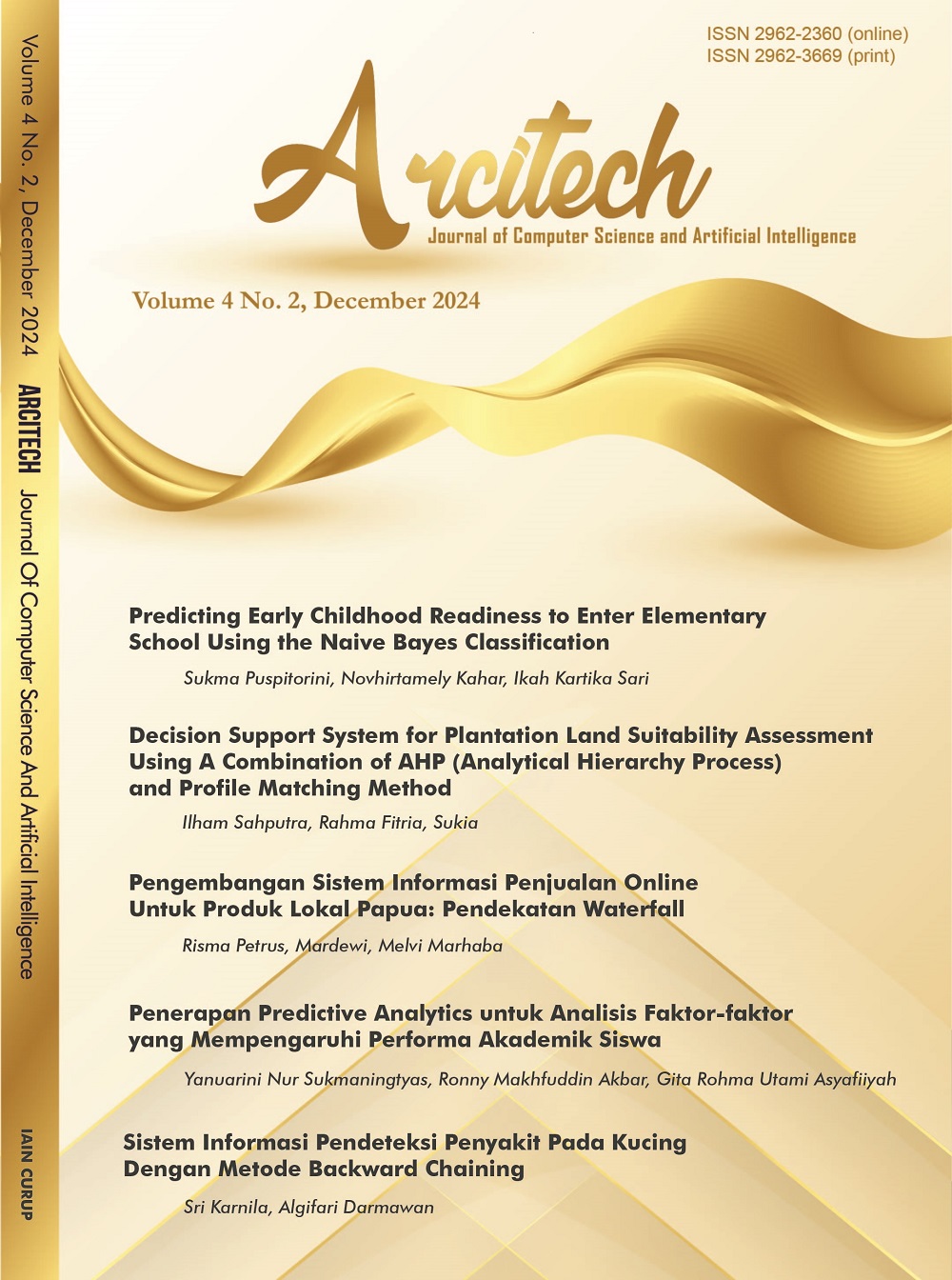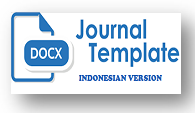Penerapan Predictive Analytics untuk Analisis Faktor-faktor yang Mempengaruhi Performa Akademik Siswa
DOI:
https://doi.org/10.29240/arcitech.v4i2.12048Keywords:
predictive analytics, education, academic performance, machine learningAbstract
Education in Indonesia currently faces several challenges, particularly the inequality of educational facilities in rural areas, leading to lower academic achievement compared to urban students. This study differs from previous research that focused solely on machine learning with academic data. Using a data-driven predictive analytics approach, the research aims to analyze factors influencing student academic performance, such as study hours, sleep hours, previous scores, and extracurricular involvement. Several machine learning algorithms including Linear Regression, Support Vector Regression (SVR), Random Forest, K-Nearest Neighbors (KNN), and XGBoost were employed to build the prediction model. The results indicated a significant correlation of 0.92 between previous scores and academic performance. Among the five algorithms, the XGBoost model demonstrated superior performance compared to the others. This highlights the effectiveness of the XGBoost model in predicting factors that affect students' academic performance and its potential as a tool for educators to develop more effective learning strategies, ultimately aiming to enhance students' academic achievements significantly.
Downloads
References
Afandi, K., Arief, M. H., Faizatul Laily, N., & Maulana Nugroho, D. (2024). Analisis Performa Akademik Mahasiswa Menggunakan Social Network Analysis (Studi Kasus: Prodi Bisnis Digital Universitas dr. Soebandi). Journal of Technology and Informatics (JoTI), 5(2), 64–69. https://doi.org/10.37802/joti.v5i2.514
Al-Alawi, L., Al Shaqsi, J., Tarhini, A., & Al-Busaidi, A. S. (2023). Using machine learning to predict factors affecting academic performance: the case of college students on academic probation. Education and Information Technologies, 28(10), 12407–12432. https://doi.org/10.1007/s10639-023-11700-0
Alita, D., & Rahman, A. (2020). Pendeteksian Sarkasme pada Proses Analisis Sentimen Menggunakan Random Forest Classifier. Jurnal Komputasi, 8(2), 50–58. https://doi.org/10.23960/komputasi.v8i2.2615
Beckham, N. R., Akeh, L. J., Mitaart, G. N. P., & Moniaga, J. V. (2022). Determining factors that affect student performance using various machine learning methods. Procedia Computer Science, 216(2022), 597–603. https://doi.org/10.1016/j.procs.2022.12.174
Chitti, M., Chitti, P., & Jayabalan, M. (2020). Need for Interpretable Student Performance Prediction. Proceedings - International Conference on Developments in ESystems Engineering, DeSE, 2020-Decem, 269–272. https://doi.org/10.1109/DeSE51703.2020.9450735
Gori, T., Sunyoto, A., & Al Fatta, H. (2024). Preprocessing Data dan Klasifikasi untuk Prediksi Kinerja Akademik Siswa. Jurnal Teknologi Informasi Dan Ilmu Komputer, 11(1), 215–224. https://doi.org/10.25126/jtiik.20241118074
Hendriyanto, M. D., & Betha Nurina Sari. (2022). Penerapan Algoritma K-Nearest Neighbor Dalam Klasifikasi Judul Berita Hoax. Jurnal Ilmiah Informatika, 10(02), 80–84. https://doi.org/10.33884/jif.v10i02.5477
Herman, Y. C. (2022). Analisis Performa Akademik Mahasiswa Menggunakan Distributed Random Forest. Journal of Applied Informatics and Computing (JAIC), 6(2), 180.
Herni Yulianti, S. E., Oni Soesanto, & Yuana Sukmawaty. (2022). Penerapan Metode Extreme Gradient Boosting (XGBOOST) pada Klasifikasi Nasabah Kartu Kredit. Journal of Mathematics: Theory and Applications, 4(1), 21–26. https://doi.org/10.31605/jomta.v4i1.1792
Ibrahim, I. H., Garba, E. J., & Adejumo, A. (2024). Predictive Model for Identification and Analysis of Factors Impacting Students Academic Performance Using Machine Learning Algorithms. Kasu Journal of Computer Science, 1(September). https://doi.org/10.47514/kjcs/2024.1.3.0013
Isnaeni, Sudarmin, Z. R. (2022). Analisis Support Vector Regression (Svr) Dengan Kernel Radial Basis Function (Rbf) Untuk Memprediksi Laju Inflasi Di Indonesia. VARIANSI: Journal of Statistics and Its Application on Teaching and Research, 4(1), 30–38. https://doi.org/10.35580/variansiunm13
Jan Melvin Ayu Soraya Dachi, & Pardomuan Sitompul. (2023). Analisis Perbandingan Algoritma XGBoost dan Algoritma Random Forest Ensemble Learning pada Klasifikasi Keputusan Kredit. Jurnal Riset Rumpun Matematika Dan Ilmu Pengetahuan Alam, 2(2), 87–103. https://doi.org/10.55606/jurrimipa.v2i2.1470
Khoeriyah, M. (2024). Menuju Indonesia Emas 2045, tapi Kesenjangan Pendidikan Masih Tinggi? 29 Oktober.
Khusaini, M. (2020). Prestasi Belajar dan Karakteristik Orang Tua: Studi Perbandingan Sekolah Menengah Atas Perkotaan-Pedesaan. Jurnal Pendidikan Ekonomi Undiksha, 12(2), 296–310.
Sihombing, P. R., Suryadiningrat, S., Sunarjo, D. A., & Yuda, Y. P. A. C. (2023). Identifikasi Data Outlier (Pencilan) dan Kenormalan Data Pada Data Univariat serta Alternatif Penyelesaiannya. Jurnal Ekonomi Dan Statistik Indonesia, 2(3), 307–316. https://doi.org/10.11594/jesi.02.03.07
Sinaga, W. A. L., Sumarno, S., & Sari, I. P. (2022). Penerapan Metode Regresi Linier Berganda Untuk Estimasi Jumlah Penduduk Pada Kecamatan Gunung Malela. JOMLAI: Journal of Machine Learning and Artificial Intelligence, 1(1), 55–64. https://doi.org/10.55123/jomlai.v1i1.143
Suci Amaliah, Nusrang, M., & Aswi, A. (2022). Penerapan Metode Random Forest Untuk Klasifikasi Varian Minuman Kopi di Kedai Kopi Konijiwa Bantaeng. VARIANSI: Journal of Statistics and Its Application on Teaching and Research, 4(3), 121–127. https://doi.org/10.35580/variansiunm31
Suryanto, A. A. (2019). Penerapan Metode Mean Absolute Error (Mea) Dalam Algoritma Regresi Linear Untuk Prediksi Produksi Padi. Saintekbu, 11(1), 78–83. https://doi.org/10.32764/saintekbu.v11i1.298
Downloads
Published
How to Cite
Issue
Section
Citation Check
License
Copyright (c) 2024 Yanuarini Nur Sukmaningtyas, Ronny Makhfuddin Akbar, Gita Rohma Utami Asyafiiyah

This work is licensed under a Creative Commons Attribution-NonCommercial-ShareAlike 4.0 International License.
Authors who publish with Arcitech: Journal of Computer science and Artificial Intelligence agree to the following terms:
- Authors retain copyright and grant the journal right of first publication with the work simultaneously licensed under a Creative Commons Attribution-NonCommercial-ShareAlike 4.0 International License (CC BY-NC-SA 4.0) that allows others to share the work with an acknowledgment of the work's authorship and initial publication in this journal.
- Authors are able to enter into separate, additional contractual arrangements for the non-exclusive distribution of the journal's published version of the work (e.g., post it to an institutional repository or publish it in a book), with an acknowledgment of its initial publication in this journal.
- Authors are permitted and encouraged to post their work online (e.g., in institutional repositories or on their website) prior to and during the submission process, as it can lead to productive exchanges, as well as earlier and greater citation of published work (See The Effect of Open Access).













